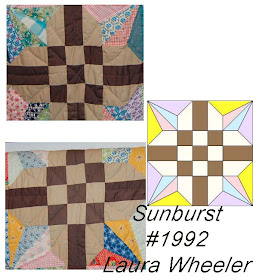
Gwen sent some photos for pattern identification.
"This quilt was given to me by a Mennonite friend, whose husband's great-aunt made this quilt…. It's an unusual pattern, one I've never seen except here in this quilt."
It's a complex design that looks to have been made in the heyday of polyester blends, the 1970s (when brown was a patchwork necessity). It is hard to identify the block but I noticed a seam in the dark brown sashing that defined a square so I drew it in EQ and here's what I saw.
 It's actually a nine-patch so I looked up Nine-Patches with small center blocks in my Encyclopedia of Pieced Quilt Patterns. It was published as "Sunburst" by the company that used the name Laura Wheeler, probably in the 1930s. Their designer drafted a lot of really complex designs that rely on secondary patterning for effect. Some are so odd you rarely see them made.
It's actually a nine-patch so I looked up Nine-Patches with small center blocks in my Encyclopedia of Pieced Quilt Patterns. It was published as "Sunburst" by the company that used the name Laura Wheeler, probably in the 1930s. Their designer drafted a lot of really complex designs that rely on secondary patterning for effect. Some are so odd you rarely see them made.
Laura Wheeler is one of the names used for a needlework pattern source in New York City. Quilt pattern collectors know little about this company which was formed as Needlecraft Service in 1932. The name was changed to Reader Mail in 1944. Quilt historian Wilene Smith determined that Nathan Kogan, Max Levine and Anne Borne formed the business, but we have no idea who the actual pattern designers were.
Needlecraft's patterns appeared in dozens of newspapers in the 1930s and still run in papers today. The 1930s were the prime years for their quilt patterns and they also sold crochet, knitting, fashion and embroidery patterns. Fictional names like Carol Curtis or Alice Brooks gave a personal touch to the patterns that were neither a column nor an advertisement, but something called a "reader service feature." Readers sent a dime to a New York address at the Old Chelsea Station post office and received a full-size pattern in the mail.
The information on Laura Wheeler is from my Kansas City Star book called Women of Design: Quilts in the Newspaper. I drew a Block of the Month basket based on designs from important pattern sources of the thirties. Here's the block for Laura Wheeler, appliqued by debi shrader.

 Ilyse Moore made the Women of Design sampler in batiks.
Ilyse Moore made the Women of Design sampler in batiks.
For more about the Encyclopedia of Pieced Quilt Patterns click here:
http://www.electricquilt.com/Shop/BlockBase/Encyclopedia.asp
For more about Women of Design click here:
http://pickledish.kcstar.com/?q=node/115
"This quilt was given to me by a Mennonite friend, whose husband's great-aunt made this quilt…. It's an unusual pattern, one I've never seen except here in this quilt."
It's a complex design that looks to have been made in the heyday of polyester blends, the 1970s (when brown was a patchwork necessity). It is hard to identify the block but I noticed a seam in the dark brown sashing that defined a square so I drew it in EQ and here's what I saw.
 It's actually a nine-patch so I looked up Nine-Patches with small center blocks in my Encyclopedia of Pieced Quilt Patterns. It was published as "Sunburst" by the company that used the name Laura Wheeler, probably in the 1930s. Their designer drafted a lot of really complex designs that rely on secondary patterning for effect. Some are so odd you rarely see them made.
It's actually a nine-patch so I looked up Nine-Patches with small center blocks in my Encyclopedia of Pieced Quilt Patterns. It was published as "Sunburst" by the company that used the name Laura Wheeler, probably in the 1930s. Their designer drafted a lot of really complex designs that rely on secondary patterning for effect. Some are so odd you rarely see them made.Laura Wheeler is one of the names used for a needlework pattern source in New York City. Quilt pattern collectors know little about this company which was formed as Needlecraft Service in 1932. The name was changed to Reader Mail in 1944. Quilt historian Wilene Smith determined that Nathan Kogan, Max Levine and Anne Borne formed the business, but we have no idea who the actual pattern designers were.
Needlecraft's patterns appeared in dozens of newspapers in the 1930s and still run in papers today. The 1930s were the prime years for their quilt patterns and they also sold crochet, knitting, fashion and embroidery patterns. Fictional names like Carol Curtis or Alice Brooks gave a personal touch to the patterns that were neither a column nor an advertisement, but something called a "reader service feature." Readers sent a dime to a New York address at the Old Chelsea Station post office and received a full-size pattern in the mail.
The information on Laura Wheeler is from my Kansas City Star book called Women of Design: Quilts in the Newspaper. I drew a Block of the Month basket based on designs from important pattern sources of the thirties. Here's the block for Laura Wheeler, appliqued by debi shrader.

 Ilyse Moore made the Women of Design sampler in batiks.
Ilyse Moore made the Women of Design sampler in batiks.For more about the Encyclopedia of Pieced Quilt Patterns click here:
http://www.electricquilt.com/Shop/BlockBase/Encyclopedia.asp
For more about Women of Design click here:
http://pickledish.kcstar.com/?q=node/115












